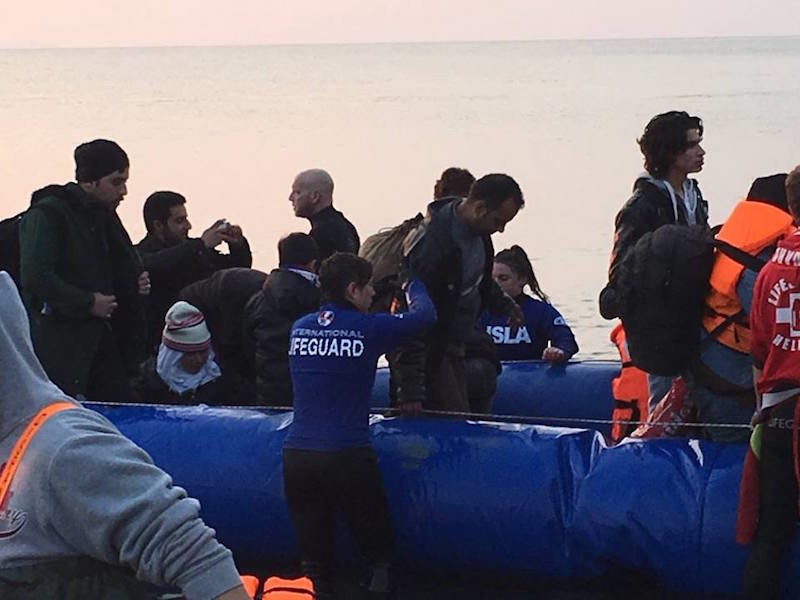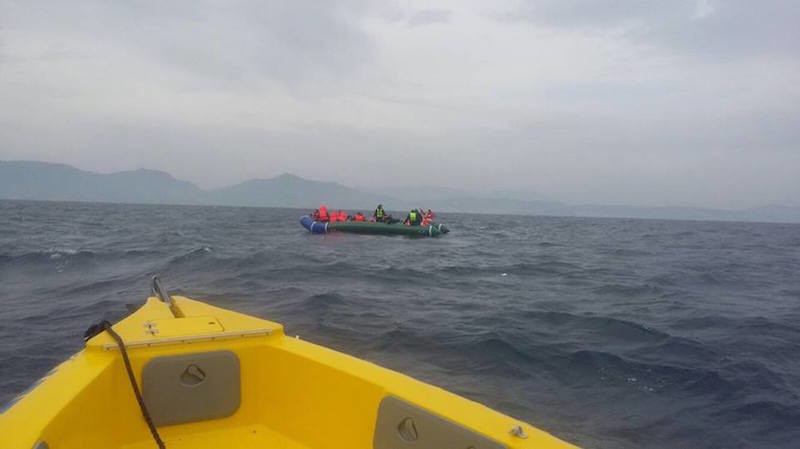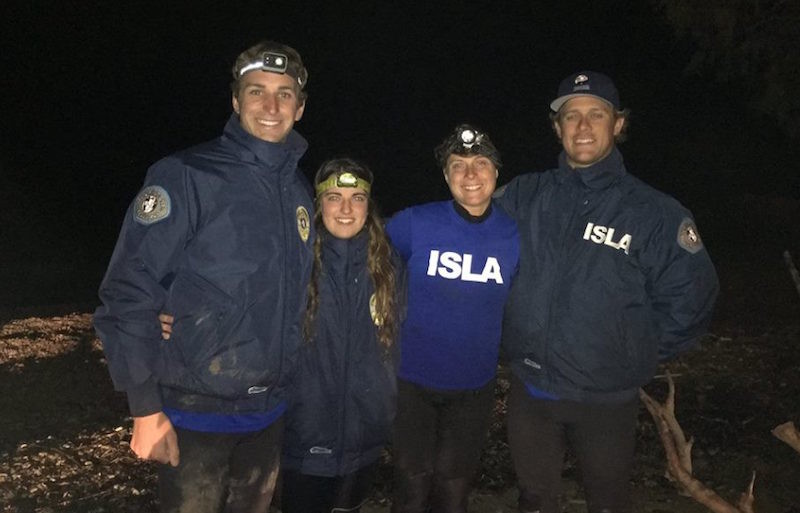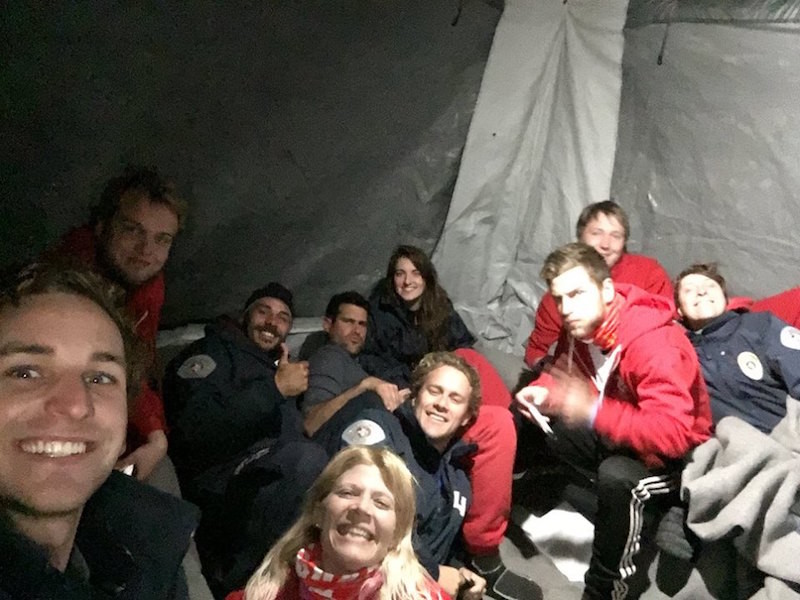Featured Volunteer: Samantha Faith Reilly

I recently returned from Greece, where, from the 11th through the 20th of March, 2016, I volunteered to help the lifeguards along the eastern coast of Lesvos, Greece, respond to scores of water crafts coming ashore filled with refugees from the civil war and genocide in Syria. While working there I represented the International Surf Lifesaving Association (ISLA) and wore their bright blue uniform.
Throughout the duration of the trip I assisted in the rescues of approximately 250 people. Our overall mission to ensure there were no drownings and to cross-train among lifeguards around the globe was successful.
On the flipside, I witnessed at first hand one of the biggest humanitarian crises of our time. I want, now, to share some stories to create awareness of this issue, and to ensure that those who have risked their lives are not forgotten.
The most tragic event I witnessed was seeing two men lying dead on the bottom of a raft. Both individuals had cardiac arrests at sea, and no one on board was able to provide aid. As soon as the raft pulled in, a nurse, an EMT, first responders and I did everything possible to resuscitate them. We worked until the ambulance arrived, but to no avail. An article written about the event can be found HERE.

RESCUE SUMMARIES
Notes taken on individual rescue missions:
13 MAR 2016 – Lifeguard Hellas Rescue Boat
Run #1
We were called to Saint George beach, Lesvos, Greece, for visual on three incoming rafts. Upon arrival, the Greek coast guard had already taken about 80 refugees onto their vessel, and radio-contacted us to collect the empty rafts and other debris in the water. (See PIC 1)
Run #2
En route back to the harbor from Trip One, we came upon two boats with at least 40 refugees on each. Proem-Aid SAR vessels escorted the rafts on the port side while Lifeguard Hellas took starboard. We went as far in as the bow would allow, and watched as the rafts drifted to shore, where scores of volunteers were waiting to usher everyone off and provide them with much-needed dry clothing. (See PIC 2)
Run #3
Approximately 0735 in the morning, Lifeguard Hellas received coordinates for a raft full of refugees with a seized engine. The coxswain, a deckhand, and I rushed to the pier where the rescue boat was docked, and deployed at 0750. The sea state was 3. There was moderate fog, and winds while moving were strong enough to blow my packaged fins/mask up off the deck. I held on for dear life while scanning the horizon as the coxswain, a lieutenant in the Greek army, skillfully pierced his way through the waves. After a bumpy wet ride to about 3 nautical miles off the coast of Lassia Beach, Greece, the raft was spotted in the distance. The refugees greeted us with glee, happy that to be saved; however, their happiness quickly turned to fear during the precarious process of getting them off their raft onto our boat. Altogether, we rescued 17 people (14 male, 2 female, and a 3-month-old infant) off their raft onto the Lifeguard Hellas craft. From there we gave them a ride to a larger SAR ship patrolling nearby from Frontex (EU), from where they were later taken to the nearest refugee camp in Greece. (See PIC 3)
20 MAR 2016 – Shore Lifeguard
Run #8
We were called to leave our post in Lassia and go to Changing Tables beach to help with an incoming raft filled with approximately 60 people. The raft got stuck 50 yards from shore, so lifeguards had to work to pull it in. Most of the people on the boat were mothers with toddlers, and elderly. Everyone was brought to shore okay. A 3-year-old girl needed first aid for abrasions on her lower right leg.
Run #9
At approximately 0430 we were requested to leave our post in Lassia and go to South Beach for visual on a raft. The boat was jam-packed with a close-knit village of 60 people. Screams rose as the crowd thinned enough to reveal two men lying motionless on the deck with a small child trapped underneath them. Medics and volunteers worked to carry the men ashore while the Lifeguards prevented anxious relatives from climbing over the sides and possibly tipping over the entire raft. A man in the crowd popped the raft, creating a loud noise that sounded like a gun shot. In sheer terror, all remaining persons either jumped or were pushed off the raft into the water. Lifeguards rushed to grab the small children first and then went back to get the adults, a second priority since most of them could stand in the thigh-deep water. Despite the extreme chaos, all persons made it to shore and were given food, clothing, and comfort by the ERCI volunteers. After no more water work was needed, we helped administer CPR.
Run #10
At approximately 0630 we left our post in Lassia and head toward a raft sighting south of Mytilene airport. We waited ashore as a raft full of refugees came in. The scene couldn’t be more picturesque – the refugees were singing as the pastel hues of the morning sun slowly rose. To my shock, one man jumped out of the boat roughly 400 yards from shore in anticipation. The three rescuers in front of me remained motionless, so I sprinted toward the survivors as fast as I could, only to find him roughly swimming himself. I swam alongside him till we were both comfortably standing, and then raced over to the boat that was slowly drifting ashore. This particular boat was filled mainly with women, children, and the elderly.
SOME WORDS ON CONDITIONS
At some time in your life you’ve, no doubt, experienced large crowds — whether on a NYC subway, during Black Friday, or as a spectator at a large parade. Now, imagine squeezing your entire extended family onto a small raft, and traveling for hours in frigid temperatures while being splashed with cold waves.
What terrible conditions these people must be faced with in order to leave their homes and everything behind and undertake a perilous journey like this, all for the hope of safety.
Being fully enveloped in this tragedy was a shock. My whole life, I’ve been sensitive to humanitarian needs such as the homeless in both the NYC and Nashville urban areas. Unfortunately, those situations are nothing, compared to the magnitude of human suffering occurring as a result of this mass migration.
You tell yourself that dramatic social economic juxtapositions have existed all over the world for centuries; however, it really doesn’t hit home until you see it firsthand. While at the airport I found it painful to see people spending big money at the duty-free shop while less than 300 yards away there were hungry refugees carrying everything they owned in small soaked bags along the shoreline.
SOME WORDS ON WORDS
Having received permission to leave my command only two days before the itinerary, I hadn’t learned much Arabic. During the orientation, I quickly picked up two words that definitely helped me later.
The first word was “Shalam,” for “welcome.” It was important to make clear to the refugees in the rafts that they were approaching friendly lands, so they wouldn’t behave erratically.
The second word I learned was “Shway, Shway,” which roughly translates to “slowly.” This expression helped to ease the refugees’ impatience and prevent panic while they waited to disembark the raft. If too many tried to get off at the same time, there was a serious risk of capsizing and/or injuries.
No matter what words you used, speaking in a calm voice was the most important thing, to avoid agitating anyone further, or cause alarm.

THE EXPERIENCE
My duty in Greece was typical for a lifeguard: wait for days without anything, but when the calls start, they come in nonstop. Working 11 to 20 hour shifts in a wetsuit is exhausting and uncomfortable. The weather for most of the week was cold and stormy. When we couldn’t make a fire, we’d sleep overnight in a car. Each day I would silently remind myself I volunteered to do this, for the purpose of being there to help others.
A POSITIVE OUTLOOK
There were several humanitarian groups on the scene to help at all the beaches. I had the opportunity to meet the UN goodwill ambassador, Angelina Jolie, as she perused camp Moria; however, I chose to use my few hours of spare time just to unwind.
Media coverage was unrestricted, so the ISLA team and I inadvertently wound up pictured in a German newspaper, on the Greek MegaTV, on UK Channel 4 news, and many other outlets.
The bottom line: In one week’s time, our team assisted in rescuing more than 400 people.
PEOPLE BEHAVING BADLY
Relations between good Samaritans could be surprisingly ugly, as well. On the beach you had lifeguards muscling with cameraman, doctors arguing over how patients were treated, and egotistical volunteers who weren’t open to sharing their territory to “newbies.” The immediate and inevitable response is, WTF! Has everyone lost their heart?
HAVE WE GROWN NUMB?
I believe the general public has grown jaded by photos of war-torn adults, starving children, and other horrific images. Syria is only one of many areas where needless human suffering exists on a terrible scale.

IN CONCLUSION
This is REAL. This isn’t a movie or a money-making scam. It’s time for our leaders to put their heads together and sort this out. It’s time for the general public to help others any way they can.
Passive silence or straight ignorance is, in its effects, just as bad as the perpetrators. No act of kindness is ever wasted, no matter how small. In the year 2016 one would hope that we, as a society would have evolved higher than this.
I believe most people have given up or forgotten that they have the power to make a difference — or even better, a fundamental change. The act of helping empowers everyone involved. If this issue isn’t one that resonates with you, you don’t have to look far to find a need within your own community.
Attached are some images taken while working on-scene. They are a good reference, but they fail to successfully communicate the full experience.
Speaking for myself, this trip to Greece strengthens my resolve to join the emergency medical service.
Thank you for reading—and for acting.
– Samantha Faith Reilly (ISLA Team 7 Member & US Navy Surface Rescue Swimmer)
#bethechange #soothersmaylive #ISLA #LifeguardHellas #safepassage #volunteer